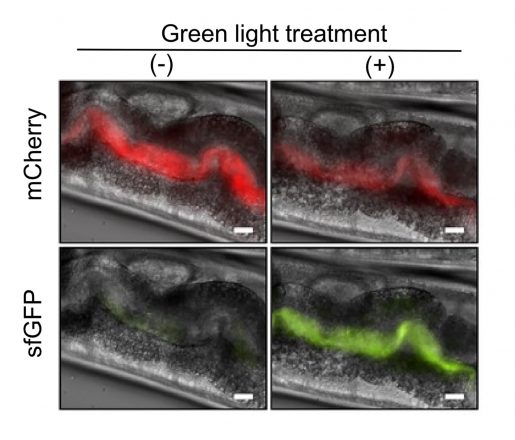
Getting old is a complex matter. Research has shown that gut microbes are one of the factors that can influence several aspects of human life, including aging. Elucidating how a specific microbial species contributes to longevity is quite challenging given the complexity and heterogeneity of the human gut environment.
To explore the influence of bacterial products on the aging process, researchers at Baylor College of Medicine and Rice University developed a method that uses light to directly control specific gene expression and metabolite production from bacteria residing in the gut of the laboratory worm Caenorhabditis elegans.
“We used optogenetics, a method that combines light and genetically engineered light-sensitive proteins to regulate molecular events in a targeted manner in living cells or organisms,” said co-corresponding author Dr. Meng Wang, Robert C. Fyfe Endowed Chair on Aging and professor of molecular and human genetics and the Huffington Center on Aging at Baylor.
In the current work, the team engineered E. coli bacteria to produce the pro-longevity compound colanic acid in response to green light and switch off its production in red light. They discovered that shining the green light on the transparent worms carrying the modified E. coli induced the bacteria to produce colanic acid, which protected the worm’s gut cells against stress-induced mitochondrial fragmentation. Mitochondria have been increasingly recognized as important players in the aging process.Switching genes on and off with light.
“When exposed to green light, worms carrying this E. coli strain also lived longer. The stronger the light, the longer the lifespan,” said Wang, an investigator at Howard Hughes Medical Institute and member of Baylor’s Dan L Duncan Comprehensive Cancer Center. “Optogenetics offers a direct way to manipulate gut bacterial metabolism in a temporally, quantitatively and spatially controlled manner and enhance host fitness.”

“For instance, this work suggests that we could engineer gut bacteria to secrete more colanic acid to combat age-related health issues,” said co-corresponding author Dr. Jeffrey Tabor, associate professor of bioengineering and biosciences at Rice University. “Researchers also can use this optogenetic method to unravel other mechanisms by which microbial metabolism drives host physiological changes and influences health and disease.”
Read the complete report in the journal eLife.
Other contributors to this work include first author Lucas A. Hartsough, Mooncheol Park, Matthew V. Kotlajich, John Tyler Lazar, Bing Han, Chih-Chun J. Lin, Elena Musteata and Lauren Gambill. The authors are affiliated with one of more of the following institutions: Baylor College of Medicine, Rice University and Howard Hughes Medical Institute.
Funding for this project was provided by Human Health Services and National Institutes of Health grants (1R21NS099870-01, DP1DK113644 and R01AT009050), National Aeronautics and Space Administration (grant NSTRF NNX11AN39H), the John S. Dunn Foundation and the Welch Foundation.
from ScienceBlog.com https://ift.tt/3ct5Sil


No comments:
Post a Comment